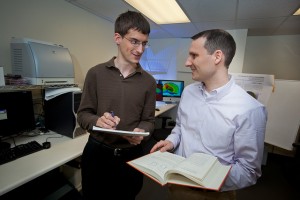By Michele Tallarita ’12

Joel Lefever ’12 and Professor Joshua Smith
Joel Lefever ’12 (Lancaster, Pa.) is spending his senior year tackling a topic that researchers have pursued for over 30 years.
A mechanical engineering major, Lefever is creating a computerized model of a health condition called hydrocephalus as his honors thesis under the guidance of Joshua Smith, assistant professor of mechanical engineering. Lefever presented his work at the National Conference on Undergraduate Research in March, and it has also been accepted to the American Society of Mechanical Engineering 2012 Summer Bioengineering Conference.
“Hydrocephalus is a disease of the brain, where an obstruction to healthy flow of fluid leads to a high fluid pressure,” says Lefever, who has worked as a teaching assistant for several laboratory classes on campus and tutors students in mathematics and physics. “This pressure causes the brain to expand outward like a balloon, which damages the tissue and results in brain damage, a lack of balance, and sometimes death.”
While researchers have been attempting to devise accurate models of hydrocephalus for decades, Lefever is creating a more sophisticated, realistic model using recently developed biomechanics software.
“The model relies on computer analysis methods to simulate a brain expanding due to internal pressure,” he says. “The brain is porous, or sponge-like, which requires a method that is more elaborate than conventional methods to represent both the brain and fluid.”
Lefever’s digital model will be able to predict which parts of the brain are most susceptible to damage during hydrocephalus, and models like his may eventually be used to develop and test treatment methods. This is especially significant because there is a lack of very successful treatments.
Though Lefever’s work is cutting edge, it’s only part of a broader project by Smith to produce a still more sophisticated model, a task that will outlive Lefever’s tenure at Lafayette. Lefever has worked with Smith since his sophomore year and has been deeply influenced by the professor’s commitment to scholastic excellence.
“Professor Smith is an incredibly challenging professor who requires me to carefully balance my research with my curricular work,” says Lefever. “He is encouraging, but he accepts nothing but high-quality work. This requires me to continuously improve in research techniques, communication skills, and time management in order to meet his expectations.”
Meanwhile, Smith has been impressed with Lefever’s independence and ingenuity.
“While I provide Joel with general direction for the project, he has taken the lead on all the individual tasks,” Smith says, noting that Lefever taught himself the software programs he would need and was able to make his research accessible to a general audience when he presented at Lafayette’s “Interdisciplinary Research Talk Series by Students for Students” last semester.
After graduation, Lefever will attend graduate school at the University of Pennsylvania to study materials science and engineering. He hopes to find a career in academia with a strong teaching component.

1 Comment
Comments are closed.